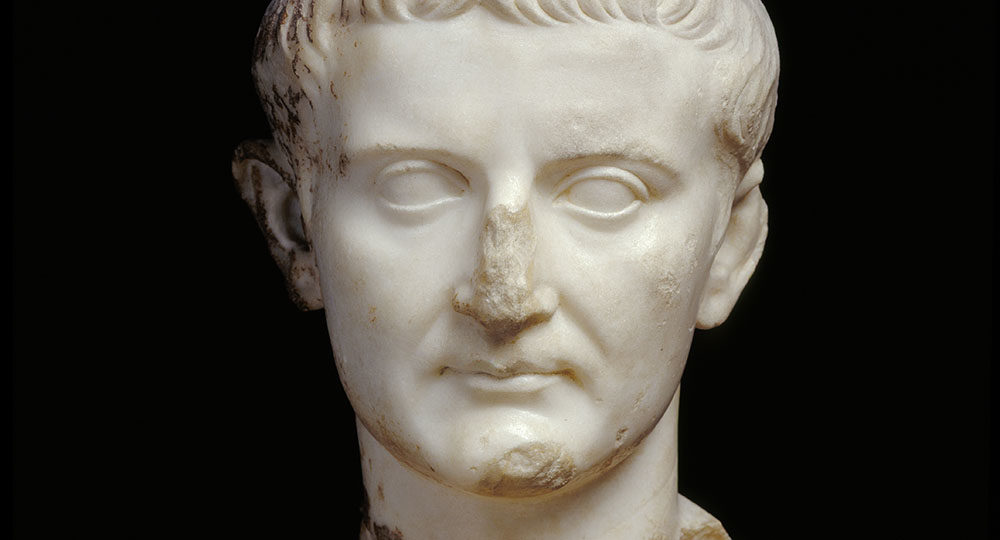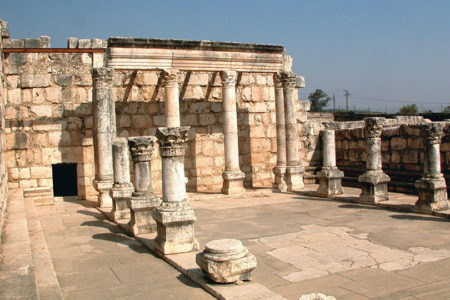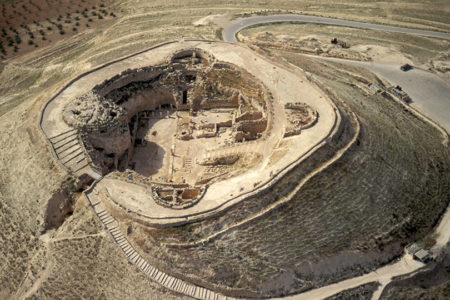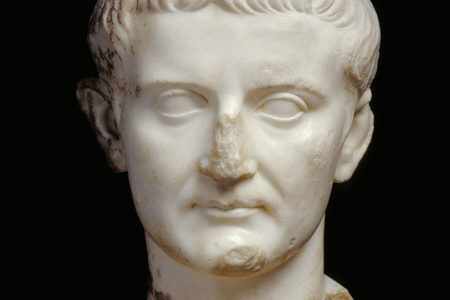Jerusalem Vs. Rome: Jewish Life in the Time of Christ
And it came to pass in those days that a decree went out from Caesar Augustus that all the world should be registered.” This statement from Luke 2:1 begins many a Christmas story and is so familiar to us that we often miss a significant point: Jesus Christ, the Savior of the world (Jn. 4:42), was born under the rule of the first true Roman emperor, Augustus, whom his subjects called “savior of the world.” Thus begins a story that climaxes with Jesus’ trial before Pontius Pilate and a discussion over who really is the King (Jn. 18:28—19:22).
The Caesars who ruled in Jesus’ day—Augustus (30 B.C.–A.D. 14) and his adopted son, Tiberius (A.D. 14–37)—are mentioned only once in Luke’s Gospel, but the implication is clear: the Jewish people were under Roman domination.
As the Roman Empire spread from west to east, with General Pompey entering Jerusalem in 63 B.C., the Romans established local kings who would be loyal to Rome. Thus the Jewish people, like those of other countries, were subject not only to Caesar’s whims but also to the infighting of local kings.
In the case of Judea, this king was Herod the Great, who was installed as king of the Jews by the Roman Senate in 37 B.C. Herod had married into the Hasmonean Dynasty through Mariamne I, though his father, Antipater, was Idumean (Edomite). (See “Herod the Not-So-Great”) Under Herod, the Jewish high priesthood was for sale to the highest bidder, and so the Jews sensed that even their Temple in Jerusalem was corrupted. The Essenes, for example, tried to separate themselves from the corruption by settling in Qumran. The result of this situation was a Messianic hope for the one who would come to free the Jewish people from Caesar, their local king, and corrupt religious leaders.
Rome’s pagan religious system sharply conflicted with Judaism. This conflict deeply affected Jewish life in the first century A.D., resulted in the destruction of Jerusalem in 70, and continued until the beginning of the second century, when the Jewish people were banned from Judea.
The Paganism of the Roman Empire
The religion of the Roman Empire developed in conjunction with the empire’s expansion. Initially, Romans worshiped their own gods centered in Rome. The mythology of the founding of Rome is located in Virgil’s Aeneid (19 B.C.). The hero, Aeneas, flees from Troy and ultimately lands in Italy. Through the priestess of Apollo, called the Sibyl, he sees his descendant Romulus found the city of Rome (753 B.C.). Thus Rome’s very origin was understood as an act of the gods who would then direct Rome to rule the world.
Initially, Roman religion came from the recognition of the sacred powers of 20 or so chief gods and goddesses. The most prominent Roman gods were Jupiter, the chief god; Juno, his wife, known as the queen of heaven; and Minerva, goddess of trade and the arts. Since the temple to Jupiter in Rome was placed on the most prominent hill, the Capitoline Hill, this triad was known as the Capitoline gods—the protector gods of Rome to whom Rome owed its power and favor in the world.
As Rome conquered first Carthage, then Greece, Asia Minor, and finally Syria and Egypt, it assimilated many peoples into the empire and many religions as well. Being pagan, Rome did so with no problem as long as the cults did not violate Roman morals. Thus the Greek pantheon of gods was adopted into the Roman pantheon simply by matching the various divine functions. The Greek Zeus was now Jupiter; Hera, now Juno; Athena, now Minerva; and as recorded in Acts, Ares was now Mars, and Artemis became Diana.
Other Eastern cults, like those involving the pagan deities of Cybele, Isis, and Mithras, were either adopted or rejected depending on their followings or the whims of the emperor. As Rome grew larger and more decadent, certain observers tied the decline of traditional Roman values to the infusion of these alien superstitions.1
The daily religious life of most people can be discerned from Paul’s compliment to the Athenians—that they were very religious—the city being full of idols (Acts 17:16–23). As pagans, they could worship many gods; and most people hedged their bets by making sure they did not offend any they believed may have a bearing on their lives, including the spirits of their ancestors. The common way of showing one’s devotion was through sacrifice. And according to one’s means, the appropriate sacrifice would be offered at the temple devoted to the appropriate god, mediated by a priest.
Temples to certain fertility goddesses, like Artemis/Diana in Ephesus and Aphrodite/Venus in Corinth, were served by hundreds of priestesses who functioned as cult prostitutes. The sex-ual aspect of pagan worship derived from the belief that the god or goddess would act based on the actions of the worshiper—in this case, bring fertility and blessing. People also practiced the Roman civil religion, with its monthly feasts to the gods, along with their local religion—all without conflict. However, Greek philosophy, traced from Socrates through Plato through Aristotle, offered an alternative to irrational paganism. Stoicism, a rational pantheism, was popular among the elite and offered another way for edu -cated Romans to maintain the civil religion of Rome by finding their roles in the universe.
Meanwhile, as Roman rule radiated from Rome, Roman culture permeated the empire. In Philippi (in Macedonia) the apostle Paul and Silas experienced the effects of being in this Roman city, under Roman law. Contrary to the apostle’s experience with the Jews, Roman reaction to the gospel was more socioeconomic. Many trades and trade unions were tied to certain gods. When men turned to the gospel and ceased worshiping those gods or purchasing the accoutrements of paganism, the city’s economy suffered, as in Ephesus, where a riot erupted (Acts 19:21–41). Thus the question for the Roman judges in those cities was whether preaching Jesus was illegal or deleterious to the public good.
It wasn’t until the middle of the first century A.D. that Roman emperors began to see themselves as divine. Initially, even the thought of an emperorship was seen as a betrayal of the republic; in fact, it precipitated Julius Caesar’s assassination. But after his death, the Roman Senate declared Caesar a god. Thus the tradition was established that emperors became divine after they died. This tradition continued until Caligula, who took upon himself divine appellations but who was also seen as insane. By the end of the first century, Domitian, in an attempt to return the Roman Empire to its ancient religious roots, demanded that he be worshiped as “master and god” and inflicted punishments on Jews and Christians. He was assassinated as a result of a senatorial plot in A.D. 96.
The Jews Under Rome
Judaism under Rome was conflicted. On the one hand, many understood that Rome was the fourth empire designated by God in the book of Daniel to rule over Judea; and so Messianic hopes were high to overthrow the pagan Romans and bring in the Kingdom. On the other hand, because Antipater had helped Julius Caesar win in Egypt, Judaism received legal status in the Roman Empire; and the Jewish people were protected with rights. This tension divided Jewish society. Those in power—the Herodian dynasty, the high priestly families, and the Sadducees—were not looking for a Messiah, since that would upset the present order and the Romans who had placed them in power. This mindset explains the chief priests’ declaration to Pilate: “We have no king but Caesar!” (Jn. 19:15). The zealots, on the other hand, sought to bring in the Kingdom through violent resistance. In modern terminology, they would be considered terrorists, their weapon of choice being the knife.
But on the whole, most Jews in Judea and the Diaspora (outside the land) simply tried to live between their obligations to God and the state. As they fought for their independence from Syria in the Maccabean revolt (166–164 B.C.), their nationalistic cry was that they would rather die than worship other gods. This commitment to monotheism and keeping the Mosaic Law, mainly the Sabbath and dietary portions, were the main concerns of Jews both in Judea and the Diaspora.
Caesar gave them the right to keep the Sabbath and keep kosher. He also gave them the right to meet regularly (have synagogues), decide their own affairs, and contribute money to their own causes.2 Their success in maintaining these rights depended on their relationship with the local ruler. In Judea, their success depended on the relationship between the Roman procurator and the designated Jewish authorities: the members of the Sanhedrin, led by the high priest. In the Diaspora, the Jewish people depended on their local elders ingratiating themselves with the local Roman authority. If they felt the local ruler was unjust, they could appeal to Caesar.
The Jewish philosopher Philo told the harrowing tale of leading a group of Alexandrian Jewish elders to meet with Emperor Caligula after the local Roman prefect in Alexandria had caused anti-Jewish riots and had restricted Jewish rights. Knowing the emperor could have them executed on a whim, they were fortunately dismissed by Caligula as simply ignorant people who did not recognize his divinity.
From Jewish sources in the first century, it is not difficult to discern that anti-Semitism was already part of the Roman mindset. Much of Josephus’ writing was an apologetic for the Jewish people, written especially to demonstrate that they were not all terrorists as perceived due to the first Jewish revolt, but were actually an ancient people who witnessed to the one true God and who should be honored as such. But it is easy to see, even in Luke’s account in Acts, that the Romans regarded the Jewish people as troublemakers, which is what Paul, as a Jew, was considered (Acts 16:20–21).
The Jewish people’s relationship with Rome in Judea descended into disaster when tensions became unbearable for both groups. In A.D. 66, the procurator in Caesarea, Gessius Florus, no longer cared about maintaining civil order but purposefully inflamed Jewish passions and hostility against Rome. The Jews revolted and captured the Antonia Fortress at the Temple in Jerusalem, which led to Vespasian’s invasion of Galilee and Titus’s destruction of Jerusalem in A.D. 70. A later emperor, Hadrian, evicted the Jews from Jerusalem in A.D. 135 after the Bar Kokhba revolt and thus ended the conflict when Jerusalem was rebuilt as Aelia Capitolina, a pagan Roman city, and the province of Judea was renamed Palestina.
A First-Century Tragedy
The Jewish story of the first century A.D. can best be described as a tragedy. God’s people were looking for their Deliverer; but when He came, they did not recognize Him. And it was only a matter of time before the civil relationship between imperial Roman rule and the absolute monotheism of Judaism became untenable. After Judea’s dissolution, the Jewish people became scattered around the empire, still waiting for their Messiah. When He comes again, this time from heaven, Israel will recognize Him (Zech. 12:10), thus ending the reign of the future Roman Empire spoken of in Daniel and completing the Times of the Gentiles (cf. Lk. 21:24). In the end, the God of Israel will reign, while the gods of Rome are scattered into dust (cf. Dan. 2:44).
ENDNOTES
- Jack Finegan, Myth & Mystery (Grand Rapids: Baker Book House, 1989), 187–215.
- P. Sanders, Judaism: Practice and Belief, 63 B.C.E.–66 C.E. (London: SCM Press, 1992), 212.







My question comes from the story of Jesus and the centurion in Luke 7 when Jesus answers the request to come to heal the centurion’s slave.
In verse six, “And Jesus went with them. When he was not far from the house, the centurion sent friends, saying to him, “Lord, do not trouble yourself, for I am not worthy to have you come under my roof.” Note: I am not questioning the solder’s belief that Jesus could heal his servant by just speaking the word and that he felt as a sinner unworthy. Luke paints a marvelous picture that inspires and brings hope. However, in real-time, with the tension of Roman occupation and the High Priest toward Jesus, could the centurion be seen welcoming Christ under his roof?
The Samaritans as a people still survive near Jerusalem. They still survive and are worth a comment in connection with the Jewish People.
Who was the Roman officer’s servant, was he jewish?